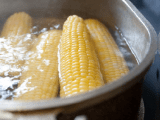
Blanching is a process in which vegetables are lowered into boiling water for a specific time. The vegetables are subsequently dropped into ice water to quickly cool, then dried and placed in freezer containers. Freezing slows down enzyme processes, but it doesn’t stop them. Blanching is recommended to assure your corn will taste as fresh as possible after they have been frozen.
That’s because blanching stops enzyme activity. Enzymes in produce help it ripen, and continue to do their work even after the produce has been picked. By stopping the enzyme action, blanching prevents the produce from becoming overripe. Blanching also helps retain color, flavor, texture and nutrients. Blanching also helps remove dirt and small organisms from the produce.
It is important to look up the specific amount of time corn needs to be blanched and follow those guidelines. If corn is under-blanched, it can actually speed up the enzyme processes. If corn is over-blanched, the nutritional value, flavor, color and texture can be negatively affected.
Learn more in Preserve it Fresh, Preserve it Safe: Preserving Sweet Corn.